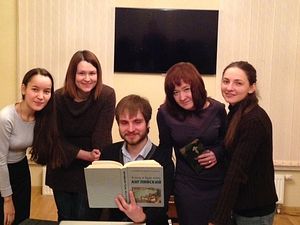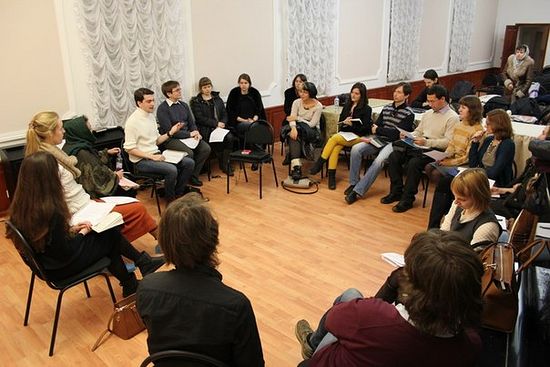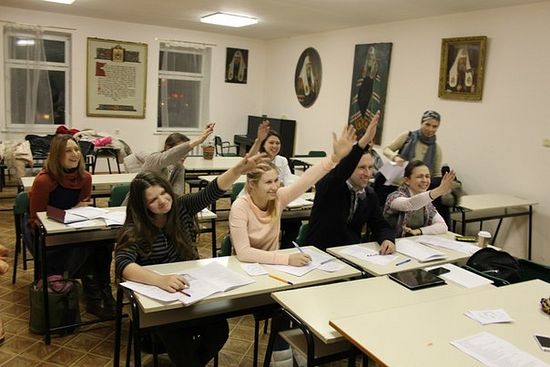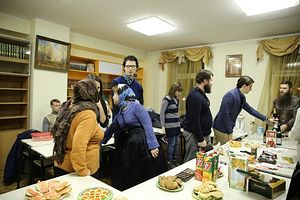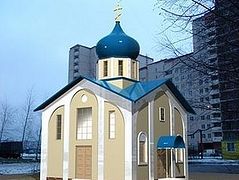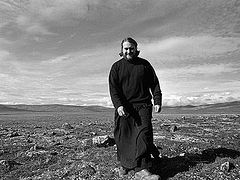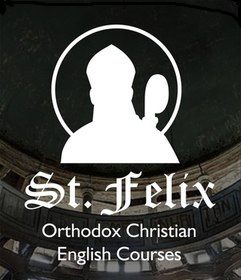
Several times a week a group meets at a church in central Moscow to study various foreign languages, and especially English. The gatherings are all part of the St. Felix Orthodox language courses. The group, founded two years ago and directed by Alexei Makarov, seeks to provide a valuable service to all who are interested, within an Orthodox context, in a spirit of Christian charity. From its humble beginnings the group has blossomed to offer courses in three languages at various levels of competency, as well as a Patristic-based Bible study for those of a high level of English, conducted by Philip Champion.
Alexei (AM), 24, holds a Master’s Degree in Orientology from the Institute of Asian and African Studies and is currently working towards his PhD at the Sts. Cyril and Methodius Theological Institute in Moscow, with a focus on translating the works of St. Isaac the Syrian. He is involved in many other activities, including Byzantine chanting at Moscow’s Mt. Athos representation church.
Philip (PC), 25, a native Russian fluent in English lived and studied in Western Europe for nearly nine years, receiving a Master’s of Theology from the Institute for Orthodox Christian Studies at Cambridge where he served as the Vice President of the Cambridge University Orthodox Society. He is also currently pursuing his PhD at Sts. Cyril and Methodius in Christology and works for the Department of External Church Relations (DECR) under Met. Hilarion Alfeyev as an Inter-Christian Relations Officer when he is not busy teaching the Bible.
Alexei and Philip sat down with us to talk about the history and purpose of the courses.
* * *
—Please give us a picture of the founding and purpose of the St. Felix Orthodox language courses.
—AM: The St. Felix courses were founded two years ago when my friend Tatiana proposed the idea of opening courses to teach English in order to prepare people to serve abroad as missionaries. I agreed, and we started doing courses initially with one group of five girls, which I conducted. We decided to choose a patron saint to pray for us and to have as a symbol, and we chose St. Felix of Dunwich because he was a missionary and Apostle to the East Anglians in the seventh century, who enlightened them with the light of Christianity. It’s also very important that he’s venerated in Europe but not very famous in Russia. We don’t have many western saints in our tradition because they’re often thought to be Catholic, but I believe that it’s important to spread the cult of western saints among Orthodox Christians to show them that the Church is universal and that before the Schism there was unity between East and West.
—Of course you’re following in good footsteps, such as those of St. John Maximovitch.
—PC: Yes, St. John Maximovitch and Fr. Seraphim Rose of blessed memory.
—Of course he learned it from St. John.
—PC: Indeed, he learned it from St. John. And now there is Fr. Andrew Phillips in Colchester in the UK who does this in Western Europe and publishes lots of books and lives of the saints to try to give people the message that ancient saints living in Western Europe are not just Roman Catholic saints. They are our, Orthodox saints, too.
Sometimes people from traditional countries think Orthodoxy is the religion of Russians, Greeks, Serbs, Romanians, and so on, and yet it’s not true because it is the Apostolic faith of the Lord Jesus Christ and His Apostles and the Church Fathers and all the saints of the last 2000 years of our Christian history, including those of the first millennium in the west.
—So you said the courses began in order to teach people English so they could go out and serve as missionaries?
—AM: Yes, this was the initial idea, and later I learned about courses in the local Mormon church used to attract new adherents, and we followed their plan because I thought it would be a shame for our Church not to have such courses and to allow outsiders to attract Orthodox Christians to their heresy.
So we started advertising in public and spreading information about our courses via the internet, on VKontakte,[1] and looking for more teachers in order to have multiple levels of courses.
—PC: And that’s actually how I found out about the course. At that time I was still living in the UK and someone told me there are Orthodox Christians living in Moscow who teach English for free, and I’m generally interested in the English language so I thought it would be fun to come and check it out. I came in September and I met Alexei and the group. He wanted me to teach too, but rather than teaching English merely as a language, I thought that people should benefit from these classes in several ways—not just linguistically but spiritually too, and in order to do that I decided to start a Biblical theology study.
—AM: We also have several other teachers. Maria, who graduated from Moscow Linguistic University, which is rather famous, and who has a professional teaching degree is the head teacher and is responsible for developing programs and methods for education. We also have other teachers without a special education but who have a talent and success with their students who like attending their lessons. We also have one girl from St. Tikhon’s University with a linguistic education. Most of them were found through the internet or brought by friends.
—Two years ago you began with five people, but obviously the program is much bigger now, with fifty students coming, and other languages being taught?
—AM: Yes, on a typical Friday we now have sixty students coming to learn English, and we also have one group each of German and French at the beginner’s level which we want to develop. Our dean, Fr. Alexander, blesses our activities and we are very grateful to him for giving us the chance to use the Sunday School building of his parish.[2]
—PC: Unfortunately, in the Orthodox life quite often we have good ideas but not the chance to realize them and make them alive and it is truly a blessing from God that we met Fr. Alexander who allows us to have our courses here, because otherwise we wouldn’t have had room to expand.
Though the courses are Orthodox, we also have people from different denominations who come here to listen, and sometimes express their opinions. It’s multi-denominational in the sense that you don’t have to be Orthodox to come here. You also don’t have to be young or old.
—Obviously the students who come have their various reasons, but what initially inspired you to want to do mission work in the Church—not necessarily to teach English, but simply to serve the Church?
—AM: I was inspired by the idea of rediscovering the Apostolic way of thinking where each member of the community would serve the others with his own talents. For instance, those who can teach English can do it for free, and they have that opportunity here, but this idea can be used in many ways. Most people have some talents—to teach, to work by their hands, to give haircuts, to babysit, and so on. The only thing to do is to find those who need your talents and offer them your service.
We started with language courses and we try to spread the information to find as many volunteer teachers as possible and to have satellite locations in other cities. And we don’t stop there but we want people to understand the core—of serving your neighbor with your talents.
—There is already something going in St. Petersburgh I believe?
—AM: Yes, there is a group in St. Petersburg which belongs to our St. Felix group. The Orthodox Missionaries of St. Pierre are leading the group there. There are also people who were inspired by our courses and created courses in other cities, but who are not affiliated with us, which is fine. The thing that is important is developing the idea, not our name.
—Of course the fact that there is a Bible study here is overtly missionary, but can you give some examples of how English has been used in a missionary sense outside of the courses?
—AM: For a year the participants of our courses went, as I said, to the English classes at the Mormon church to improve our English, because we had only one group then and no native speakers. So we improved our level with Mormon native speakers and after the lessons during the tea we would speak to them about Orthodoxy, and some people started visiting our courses, and we still have some members who we originally met there.
—So you were well received there?
—AM: Yes, they didn’t reject us, and we even had some small debates with them, which for me was a great chance to learn Biblical vocabulary and to improve my skills in talking about theology in English.
—Do you mean that you had formally organized debates, or do you mean just during the tea?
—AM: They have meetings aimed at converting people to Mormonism. Two American guys and one Russian Mormon are basically brainwashing people. We went once with Tatiana, who first had the idea for our courses, to speak with Mormon girls at their place and we started asking them questions. I asked whether they knew that there are more than 1,000 corrections to the Book of Mormon since the first edition, and they started trembling and said they were not allowed to talk about it, and they became really nervous and said that they had to go, and left very quickly and kicked us out.
—Most of our readers are in America. Is there anything you’d like to say to inspire young Orthodox Americans who are mainly surrounded by non-Orthodox people?
—PC: I would like to say, as someone who has lived in the West as well, to stay strong in your faith even when everything around you tells you not to. It’s very important to stay faithful to Christ under all circumstances. It seems the way things are going now, just as in ancient times, many people tend to become very displeased with Christianity and Christian values and all Orthodox believers need to stay strong. Secondly, we are all members of the same Body, the same Church, and this spiritual bond that we have, especially in the chalice, in the Body and Blood of Christ, is the strongest bond there is, and we here in Russia certainly feel this way about our brothers and sisters in Christ. All politics aside, it’s the spiritual kinship that matters, and we would like Americans to know that.
—AM: In talking with Orthodox Christians form England and America I have heard that sometimes people pay too much attention to the cultural aspects of the Church, and this is a problem for many Christians. I want us to understand that this aspect is not that important, because Orthodoxy is not a culture, but a faith, a faith in Christ, which is universal, and that’s why we should see beauty in this plurality and not try to imitate Byzantium or Holy Russia, but try to follow the Commandments using the resources and culture that we have received, and be useful where we live.
—Alexei and Philip, thank you very much for your sharing your time and ideas with us.
* * *
Several other participants, both teachers and students, were excited to share their impressions of the St. Felix language courses:
Maria Grigorieva, teacher:
The St. Felix courses are special. I never expected it but they have become a big part of my life. They have given me many new friends and a wonderful feeling: that I'm not alone—that there are people who think and act as I do, and they are not freaks as some people imagine believers to be! Teaching here is a joy, and we all feel that what we are doing is not just a waste of time, but that people are really being helped, although it's not very modest to say. And we hope more and more people will join us!
Ekaterina Tsyganok, teacher:
I teach the elementary level courses in the St. Felix program in Moscow. We offer courses in several languages, although English is the foundational and the most popular among our students. Our English classes are practically overflowing! I think such a keen interest in learning English in Russia stems not only from the fact that English is the international language of communication, but that language helps us to better understand the culture of English-speaking people.
In our courses, students learn not only the grammar and rules of English, but they also have an opportunity to talk about Orthodoxy in America.
Such dialogues about spiritual life in the US help our students to understand that there is in fact a spiritual connection between Russia and America in spite of the present political situation.
I think it would be wonderful to hear of such courses in America for the Russian language, and together we could deepen our bond and exchange of Orthodoxy here in Russia with America and vice versa.
OIga Mirzalieva, student:
Thank you to those who took the time and effort to create these wonderful language courses! I am in the elementary level courses, and we are very lucky to have such a teacher who teaches as a private tutor, scolds like a loving mother, and motivates us to do our best. Due to the exceptional qualities of our teacher the group is very friendly and lively. We often have dialogues and involve every student.
I can say that my level has certainly improved since I began the courses, and with each lesson my knowledge base is widened and strengthened. I intend to continue on in the classes to further my valuable education.
Maria Davydova, student:
I enjoy participating in a vivid discussion of the Gospel at the St. Felix Bible study every Friday, that, in my opinion, could hardly leave anyone indifferent, and also encourages people to study the Scriptures more themselves. Furthermore, during our conversations I always have the feeling of being among friends in a warm atmosphere. I'm really thankful, that one of my friends invited me once to the courses, and for all the good and sophisticated people I have met there.
Anastasia Beggins, student:
The Bible study is important for me because so many things in Christianity and the Scriptures seem obvious to me and I am learning that actually they are not. When someone asks me questions about the Orthodox faith or the Bible sometimes I don’t have clear answers even for myself. These meetings keep my attention on the essential points of our earthly life—the real aim of it, and help in finding the answers. Moreover, it is a great opportunity and pleasure to communicate with other young Christians and realize that there still are people who take this life seriously and try to find their way following after Christ.
* * *
In celebration of the second anniversary of the courses, a Moleben in honor of St. Felix was served in English in February, 2016:
St Felix of Burgundy the Bishop of Dunwich and Enlightener of East Anglia, commemorated on March 8
Troparion—Tone 8
Felix of Burgundy, hierarch and teacher, preaching the Word of life, / Thou didst gather a rich harvest of believers; / Together with Furzey of Ireland, pilgrim for the love of the Lord, / Outstanding in virtue, renowned in word and deed; / Enlighteners of East Anglia, we rightly praise you, holy and God-bearing fathers.
Kontakion—Tone 2
Having come to the land of Sigerberht, the righteous king, / Thou didst preach the kingdom of Christ our God, / And as a first-fruit the king himself received the tonsure, / Seeking an everlasting kingdom; / And mindful of his monastic vow, / He lay down his life, unarmed in the midst of battle; / Wherefore, O Felix and Furzey, we venerate thy memory crying out: / Glory to Christ our King the Redeemer of the World.
* * *
For more information, see the St. Felix social media page (mostly in Russian).

